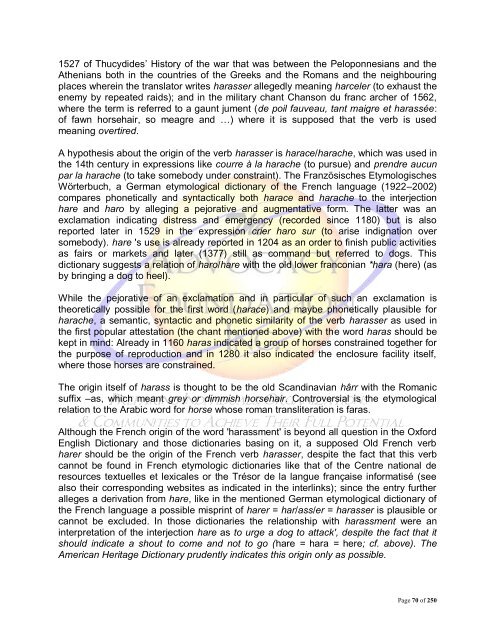Institutional Racism
Institutional Racism
Institutional Racism
Create successful ePaper yourself
Turn your PDF publications into a flip-book with our unique Google optimized e-Paper software.
1527 of Thucydides’ History of the war that was between the Peloponnesians and the<br />
Athenians both in the countries of the Greeks and the Romans and the neighbouring<br />
places wherein the translator writes harasser allegedly meaning harceler (to exhaust the<br />
enemy by repeated raids); and in the military chant Chanson du franc archer of 1562,<br />
where the term is referred to a gaunt jument (de poil fauveau, tant maigre et harassée:<br />
of fawn horsehair, so meagre and …) where it is supposed that the verb is used<br />
meaning overtired.<br />
A hypothesis about the origin of the verb harasser is harace/harache, which was used in<br />
the 14th century in expressions like courre à la harache (to pursue) and prendre aucun<br />
par la harache (to take somebody under constraint). The Französisches Etymologisches<br />
Wörterbuch, a German etymological dictionary of the French language (1922–2002)<br />
compares phonetically and syntactically both harace and harache to the interjection<br />
hare and haro by alleging a pejorative and augmentative form. The latter was an<br />
exclamation indicating distress and emergency (recorded since 1180) but is also<br />
reported later in 1529 in the expression crier haro sur (to arise indignation over<br />
somebody). hare 's use is already reported in 1204 as an order to finish public activities<br />
as fairs or markets and later (1377) still as command but referred to dogs. This<br />
dictionary suggests a relation of haro/hare with the old lower franconian *hara (here) (as<br />
by bringing a dog to heel).<br />
While the pejorative of an exclamation and in particular of such an exclamation is<br />
theoretically possible for the first word (harace) and maybe phonetically plausible for<br />
harache, a semantic, syntactic and phonetic similarity of the verb harasser as used in<br />
the first popular attestation (the chant mentioned above) with the word haras should be<br />
kept in mind: Already in 1160 haras indicated a group of horses constrained together for<br />
the purpose of reproduction and in 1280 it also indicated the enclosure facility itself,<br />
where those horses are constrained.<br />
The origin itself of harass is thought to be the old Scandinavian hârr with the Romanic<br />
suffix –as, which meant grey or dimmish horsehair. Controversial is the etymological<br />
relation to the Arabic word for horse whose roman transliteration is faras.<br />
Although the French origin of the word 'harassment' is beyond all question in the Oxford<br />
English Dictionary and those dictionaries basing on it, a supposed Old French verb<br />
harer should be the origin of the French verb harasser, despite the fact that this verb<br />
cannot be found in French etymologic dictionaries like that of the Centre national de<br />
resources textuelles et lexicales or the Trésor de la langue française informatisé (see<br />
also their corresponding websites as indicated in the interlinks); since the entry further<br />
alleges a derivation from hare, like in the mentioned German etymological dictionary of<br />
the French language a possible misprint of harer = har/ass/er = harasser is plausible or<br />
cannot be excluded. In those dictionaries the relationship with harassment were an<br />
interpretation of the interjection hare as to urge a dog to attack', despite the fact that it<br />
should indicate a shout to come and not to go (hare = hara = here; cf. above). The<br />
American Heritage Dictionary prudently indicates this origin only as possible.<br />
Page 70 of 250

















